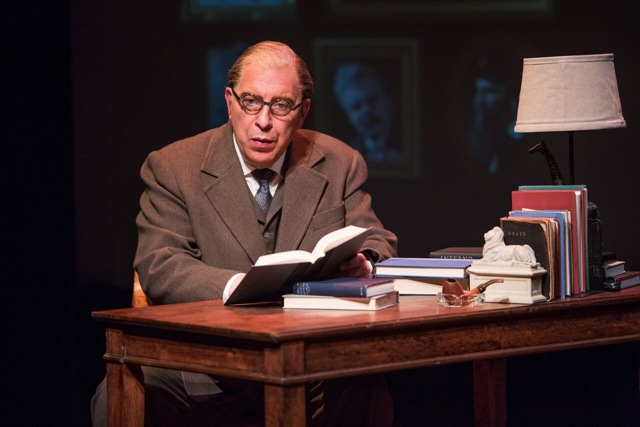Max McLean as C.S. Lewis

Max McLean as C. S. Lewis in The Most Reluctant Convert.
Christian History recently spoke to Max McLean, well-known actor and founder and artistic director of the New York City-based Fellowship for Performing Arts, about the work of FPA, especially its shows based on the life and works of C. S. Lewis.
CH: Tell us about the Fellowship for Performing Arts and your approach to theater.
MML: The mission of the Fellowship for the Performing Arts: to produce theater from a Christian worldview meant to engage a diverse audience. The way we execute that mission is to pay careful attention to the selection of material; we want material that has the ability to capture the imagination of the people who do not share the Christian worldview.
We execute that to the highest level our budget will allow, so we can play the great performing arts venues in New York City and around the country, the place where Broadway touring companies go. We create our work in New York City, have a season in New York City, and then spend 25-35 weeks on the road in the US. We’re also starting to have an overseas presence.
We incorporated in 1992 and did a lot of college and university tours early on; we’re going back to that now, too. We recorded various translations of the Bible in ways that take advantage of the narrative power of the Bible, the story aspect, which we helped to showcase. Originally we did a lot of presentations from the Bible. Genesis played off-Broadway in the 1990s. Mark’s Gospel toured to colleges. It also toured in Chicago and received the Jeff Award—Chicago theatre’s highest honor.
CH: What’s the Lewis connection about?
MML: We spend a lot of time with Lewis because he has been our mentor and a mentor for many Christians who are trying to find ways to capture the imagination.
Lewis says that the imagination is the organ of meaning and reason is the order of truth. I think what he meant by that is this: Unless a thought captures your imagination, it’s not going to generate the rational thought to understand it and engage the will enough to initiate change.
The Screwtape Letters was our first Lewis show and was very successful. The Great Divorce was a much tougher nut to crack in terms of adapting for the stage. I think that book is the key to Lewis, really. It is very pivotal in my own understanding of Lewis, and was pivotal in my desire to do The Most Reluctant Convert, the story of Lewis’s journey from atheism to Christianity. It ran for 15 weeks in New York. Wherever we tour we do well with that show.
Right now we’re working on Shadowlands, the late-life love story of Lewis and Joy Davidman, who happens to be a Jewish New Yorker. It’s a great juxtaposition between the stuffiness of Oxford dons and the brashness of New York. It’s very compelling on stage, beautifully written by William Nicolson. He has a way of getting to the heart of a story—in this case, how Lewis was really quite afraid of love and kept it at a distance until he met someone who he fell in love with and it kind of shattered him.
CH: We’ve got an issue coming out about Christianity as an urban faith, both historically and in the present moment. Can you talk about being a Christian in New York City?
MML: I’m originally from Morristown, New Jersey. My wife, Sharon and I began coming into the city and became part of Redeemer Presbyterian Church in 1999 under Timothy Keller’s ministry. We moved into the city in 2008. By the way, Keller mentioned that C. S. Lewis is his favorite writer; he would quote long passages from Lewis such as from Miracles and The Great Divorce, trying to capture the imagination of New Yorkers. It ignited a desire to get into Lewis more deeply than I otherwise would have. It also shaped my approach to evangelism in the city, modeled on Keller’s practice of staying the course for a long time, working within the city’s arts community and patrons; and responding to questions as they come up.
Shadowlands is running now in New York City until January 7; you can get tickets here. Check out our award-winning video C.S. Lewis through the Shadowlands, produced with the BBC. Read more about Lewis’s desire to capture the imagination for Christ in Christian History issue #113, Seven Literary Sages, and check out our just-released issue #124 on Christianity in the City.



